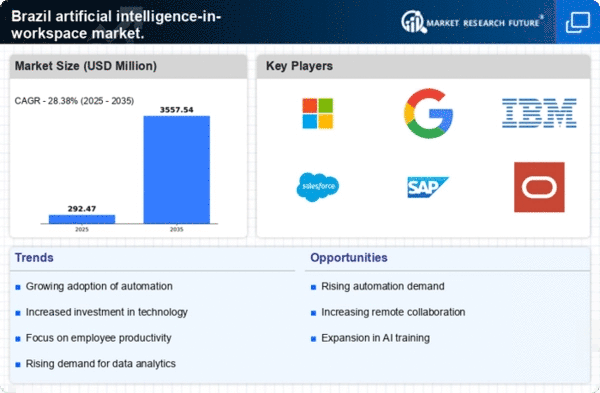Integration of AI in Remote Work
The shift towards remote work has catalyzed the integration of AI technologies within the workspace in Brazil. Organizations are increasingly adopting AI-driven tools to facilitate communication, collaboration, and project management among remote teams. This trend is reflected in a reported 30% increase in the use of AI applications designed for virtual collaboration. The artificial intelligence-in-workspace market is thus adapting to meet the needs of a distributed workforce, providing solutions that enhance productivity and engagement. As companies continue to embrace flexible work arrangements, the demand for AI solutions that support remote operations is expected to grow, further driving market expansion.
Focus on Enhancing Employee Experience
In Brazil, there is a growing emphasis on enhancing employee experience through the implementation of AI technologies. Organizations are leveraging AI to personalize work environments, improve job satisfaction, and foster employee engagement. Recent studies indicate that companies utilizing AI-driven tools to assess employee feedback and performance see a 20% increase in overall satisfaction. This focus on employee experience is reshaping the artificial intelligence-in-workspace market, as businesses seek to create more adaptive and responsive work environments. By prioritizing employee well-being, organizations are likely to attract and retain top talent, thereby contributing to the market's growth.
Rising Demand for Automation Solutions
The artificial intelligence-in-workspace market in Brazil is experiencing a notable surge in demand for automation solutions. Businesses are increasingly recognizing the potential of AI to streamline operations, enhance productivity, and reduce operational costs. According to recent data, the automation sector is projected to grow by approximately 25% annually, driven by the need for efficiency in various industries. This trend indicates that organizations are investing in AI technologies to automate repetitive tasks, allowing employees to focus on more strategic initiatives. As a result, The artificial intelligence-in-workspace market is likely to expand significantly. Companies are seeking innovative solutions to remain competitive in a rapidly evolving landscape.
Regulatory Support for AI Implementation
The Brazilian government increasingly recognizes the importance of AI technologies in driving economic growth and innovation. Regulatory support for the implementation of AI in various sectors is emerging as a key driver for the artificial intelligence-in-workspace market. Recent initiatives aimed at promoting AI adoption include funding programs and policy frameworks designed to facilitate the integration of AI solutions in businesses. This supportive regulatory environment is likely to encourage more organizations to invest in AI technologies, thereby accelerating market growth. As Brazil continues to develop its AI ecosystem, the artificial intelligence-in-workspace market stands to benefit from enhanced collaboration between the public and private sectors.
Investment in AI Research and Development
Investment in research and development (R&D) for AI technologies is a critical driver of the artificial intelligence-in-workspace market in Brazil. Companies are allocating substantial resources to innovate and develop advanced AI solutions tailored to specific industry needs. Data suggests that R&D spending in the AI sector is expected to reach $1 billion by 2026, reflecting a commitment to fostering technological advancements. This investment not only enhances the capabilities of AI tools but also positions Brazil as a competitive player in the global AI landscape. As organizations continue to innovate, the artificial intelligence-in-workspace market is poised for significant growth.
















